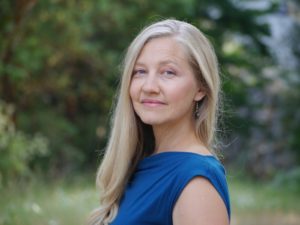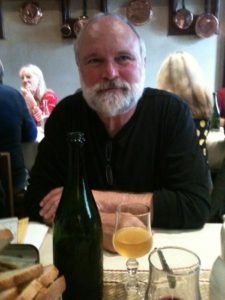After a year of virtual events, the Victoria Festival of Authors is back for their sixth annual event, presenting a hybrid of in-person and online activities for those eager to leap into new literary adventures created by the imaginations of 33 wordsmiths and hosted in the expansive stadium of each reader’s mind. The contributors are an eclectic and diverse mix of local authors eager to bare their souls to new and old generations of readers.
Among their ranks is local author Carla Funk, who was born and raised in Vanderhoof, BC, which happens to be one of the oldest Mennonite settlements in British Columbia, nestled deep in the Nechako Valley. Funk’s new book, Mennonite Valley Girl: A Wayward Coming of Age, is a memoir exploring what it was like to grow up as a girl in this culture.
“All three words in the title are circling themes or patterns within the book,” says Funk. “What did it mean to grow up in a Mennonite family of origin? What did it mean to grow up in this valley, right in the middle of the province, and then what did it mean to grow up female in that context? So those three words—Mennonite, valley, and girl—are circling, questioning heritage, questioning the place that we come from and who we are within that place.”

Growing up in a family of storytellers trained Funk to find stories in her own life and in the lives of those around her.
“I was really blessed to grow up in a family that loved stories, so that component of oral tradition was very much part of my upbringing,” she says. “I think it sort of hardwires you to receive and look for stories in the world. All of our fiction is built out of nonfiction, ultimately. It’s built out of the pieces of our reality; even our imaginations are populated with what we know in the world, what we experience.”
Funk is compelled to share her memories because she hopes they can connect with people on a fundamental level.
“Some memories carry in them a sense of universality—it’s almost as if something is glowing inside the memory and insisting that it’s more than just mine. It maybe belongs to or shares something with the experience of other people,” she says. “Even if the details of the story are not the same, there’s a core truth or a human experience that can be shared, and those are the ones that I’m interested in.”
Funk says that sharing her memories is an opportunity to share her life with other people and find some common ground that allows for self-reflection and growth.
“When I read other people’s memoirs, I read it to hold a mirror up to my own life, and to commune with somebody else’s life, and often I’ll find out something true by writing down my own story,” she says. “I think that when we write anything, we find out something about ourselves, we come to some sort of an illumination. To be invited into someone else’s life is really to be asked to look at your own life more deeply, or with more curiosity.”
Stories push us to move away from our self-centred instincts, says Funk; they create interpersonal connection.
“I think the benefit of growing up with stories is that it reminds you that there are more people in the world than just yourself,” she says. “It teaches compassion, it teaches you to listen, and, gosh, it just gives the gift of having your imagination and your mind’s eye lit up by somebody else’s story rather than just your own.”
New Brunswick-based author Mark Jarman, who will also be a guest at the festival, studied writing at UVic, where he has also taught. He found it difficult to maintain his creative flow after graduation, but he found ways to push through the dry spells.
“After I got out of the workshops I found it hard to write on my own,” he says. “It’s funny, because now I’m kind of obsessed, I just write no matter what, but it did take me a while to figure out how to do that without a workshop, without a deadline.”

Jarman enjoys reading and writing short stories, and laments that they’re disincentivized in the industry.
“Stories are great, but they kind of get disrespected in a way, which bugs me,” he says. “Agents and editors, they always want you to write a novel, but I think people should be able to work on whatever they want, you know. I think that some short stories, the really good ones, they’re as good as a novel, they’re just a lot faster to read.”
Jarman’s most recent publication is Czech Techno, a collection of stories using music as a central theme.
“I think [music has] always been an influence on me, always been in the background,” he says. “I think that singers like Hank Williams are as much an influence on me as writers like William Faulkner. There’s a singer I like, Gillian Welsh, she does this kind of Appalachian country stuff, really sad, but she said punk is an influence on her, and to me that makes complete sense. It’s not coming through in the music, but there’s something in the background.”
Jarman feels that writers are disadvantaged in popular entertainment, because the barrier to engagement is much higher than it is with music.
“I think writers are always jealous of musicians, because music’s got such power and immediacy,” he says. “You’ve got an amp and a guitar and you hit a chord and, boom, it’s right there, whereas if you work on a story, a year later you might hear back from an editor who says no, so there’s some attraction to just making a loud noise that’s instant and there.”
Like Funk, Jarman feels that tradition is a long-standing part of human culture, and is ingrained in us.
“You go back to primitive peoples and they’re sitting around a fire and telling stories. I play on an old-timers’ hockey team, and we just sit around the room afterwards, telling stories. Even if people tell jokes, it’s the same thing, we just sit and listen to someone,” he says. “There isn’t a fire in the middle of the room, there’s a cooler of beer instead, but to me it’s kind of primal, it goes back forever and will probably keep going.”
The Victoria Festival of Authors
Various times, Wednesday, September 29 to Sunday, October 3
Various prices and venues
victoriafestivalofauthors.ca
